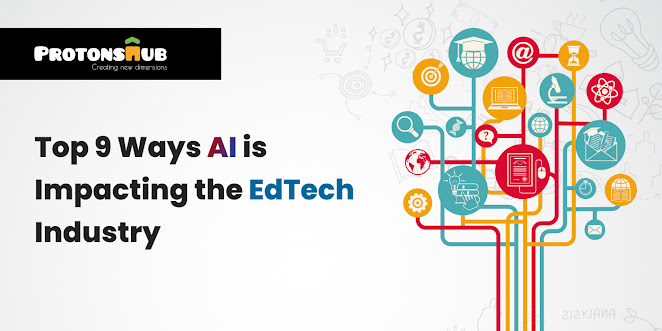As per a report, AI technology in the education market has had a market size of $4 billion in 2022. This figure is expected to grow from 2023 to 2032, at a CAGR of 10%, making education even more personalized.
Here are the top 9 ways how AI is impacting the EdTech industry for good:
1. Personalized Learning
Personalized learning is one of the most revolutionary AI trends in the education industry.
Although you can upskill yourself via the information available on the internet. But these might not comply with your needs and expectations. That’s where personalized learning enters!
AI can rightly customize the education content to offer the highest level of user satisfaction and to suit the different learning styles of individual students. This drastic shift from the traditional teaching method to the advanced method has made learning much more enjoyable and accessible.
The use of intelligent tutoring systems and adaptive learning algorithms has made this revolution possible. Adaptive learning can right adjust the type and difficulty of content as per individual performance.
This is possible because adaptive learning algorithms use the interests, strengths, and weaknesses of students to create a learning pathway.
2. Learning Analytics
Learning analysis refers to the process of analyzing, collecting, and processing student data. It helps optimize learning and environments for a better experience.
What’s more? Well, learning analytics also uses AI algorithms to understand how students learn and how their learning paths can be made easier.
Educators can use this AI in EdTech trends to understand which content type and teaching method is the most effective. AI is capable of predicting student’s performance by analyzing their current learning patterns. Likewise, AI also provides recommendations on how to enhance their learning patterns.
3. Virtual and Augmented Reality
VR and AR in education help create interactive learning environments to boost the education experience. These technologies also create dynamic and interesting interactions between students and teachers, making education more engaging and effective.
It's worth mentioning that AR and VR can virtually transport students to any geographical location, making it easy for them to learn even the most complicated abstract concepts.
For instance, while learning about DNA molecules, students can virtually explore its structure and know its history in an engaging way.
4. Smart Chatbots
The use of chatbots is becoming increasingly popular in the education industry because they are great assistants, ready to help students 24/7. Besides this, chatbots also help manage administrative tasks like reminders and scheduling.
So, during EdTech software development, you must consider integrating chatbots to easily perform various functions, from providing 24/7 assistance to offering custom study tips.
5. Task Automation
AI in virtual classrooms is taking up the most value-added tasks and creating a personalized teaching process. In addition, AI solutions for education like task automation can also grade tests, check homework, maintain reports, manage administrative tasks, and make notes.
By integrating AI into your education business, you can easily achieve your daily goals and automate everyday activities.
6. Identify Classroom Vulnerabilities
Another advantage of Artificial Intelligence in EdTech is identifying classroom vulnerabilities and maintaining a positive impact with remote learning. With AI and education going hand-in-hand, manual and virtual teaching is possible, which is enhancing the teaching-learning process for individuals.
7. Custom-Data Based Feedback
When crafting learning experiences, the fundamental ingredient is feedback. It helps differentiate between effective and dull teaching styles because the former includes giving continuous feedback.
Regular feedback from trusted sources helps AI analyze and determine work reports. With data-based feedback, AI can provide better student satisfaction, help them understand where they lack, and eliminate the bias factor from learning. The feedback can be customized as per the teacher’s and student’s performance.
8. Secure Learning Systems
AI in EdTech is delivering rapid innovations but issues like data protection and outdated certification processes are causing hindrances. However, AI-based solutions can be used to overcome these challenges and bring a positive influence in the education sector.
9. AI in Examinations
Did you know that AI can be actively used in examinations and interviews to detect fraud? By using AI-based programs, supervisors can monitor individuals via web browsers, microphones, and web cameras.
EdTech companies, be they small or large, use AI-based solutions to address users’ pain points. If you are also in the education sector and would want to stay ahead in the market, integrate AI into your business.
Benefits of AI in EdTech
By integrating artificial intelligence, the education sector can experience many potential benefits for both learners and education institutes.
For instance, AI-powered tools help improve student performance by explaining complex concepts, which will eventually enhance their academic achievements. Likewise, AI-powered solutions can help save more money than traditional methods, especially in remote and distance learning environments.
Conclusion
The role of AI in the education sector is undeniable. That’s why many businesses have integrated AI solutions like chatbots into their apps to offer a better learning experience to students. Likewise, businesses also use AI algorithms to help students identify where they lack and provide them with custom plans.
You can reach out to a trusted education app development company to avail of the best services!



